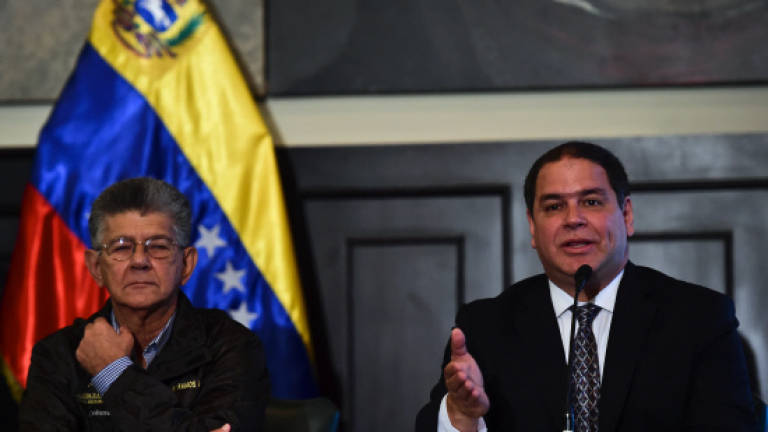Venezuela delays announcing endgame of anti-Maduro referendum

CARACAS: Venezuelan authorities on Monday postponed announcing the dates for the final stage in the opposition-led push to call a referendum on removing embattled President Nicolas Maduro from power.
According to the opposition, the National Electoral Council (CNE) pushed back from Tuesday to Friday a much-anticipated announcement on when the leftist president's opponents will be allowed to begin collecting the four million signatures needed to trigger a recall vote.
The opposition coalition behind the recall campaign, the Democratic Unity Roundtable (MUD), must collect the signatures – 20% of the electorate – in just three days.
It is the last step in a bureaucratic obstacle course to force a referendum, which MUD is racing to do by the end of the year.
The CNE has said it is looking at late October for the petition process. The opposition says that is too late and accuses the authorities of stalling.
MUD is racing to force a vote by Jan 10 – the deadline to trigger new elections if Maduro loses.
After that date, a "yes" vote would simply transfer power to his hand-picked vice president for the rest of his term, until 2019.
Seeking leverage, the opposition has organised a series of protests. It estimates a million people took to the streets in the largest one, on Sept 1.
Opposition leaders announced they would hold a new protest on the day of the CNE announcement, pushing back a protest previously scheduled for Wednesday in order to keep up the pressure.
Political analysts warn the country risks unrest if a recall vote is not held by the end of the year.
Maduro's opponents blame him for an economic meltdown marked by food shortages, riots and looting.
The country is facing its third year of deep recession this year, with inflation set to top 700%, according to the International Monetary Fund.
Eighty percent of Venezuelans want a change of government, according to the polling firm Datanalisis.
Oil-rich Venezuela is facing its third year of deep recession this year, hit hard by the plunge in global crude prices since mid-2014.
The country has skidded into crisis as global crude prices have plunged since mid-2014, threatening Maduro and 17 years of leftist rule launched by the late Hugo Chavez in 1999.
To alleviate growing hunger, Maduro has launched an emergency supply plan overseen by no fewer than 18 army generals – one each for rice, beans, toilet paper and 15 other staples.
"We're on the verge of breaking the economic war, and that is making the radicals despair," Vice President Aristobulo Isturiz said Sunday, promising the coming months would bring shorter lines and lower inflation.
But the opposition says elections offer the sole path out of the crisis.
"The only way to address the crisis is to speed up the electoral solution," said Torrealba.
"That's why the date (for collecting signatures) has to be as soon as possible."
The recall effort has been marked by months of political wrangling and street protests, played out against a backdrop of food shortages, riots and looting.
The opposition alleges the electoral authorities are in bed with Maduro – along with the Supreme Court, which has systematically blocked opposition bills since it won control of the legislature in December.
Seeking leverage, the opposition has organised a series of protests.
If the opposition gets the required signatures, the CNE will have a month to verify them, then three months to organise the referendum.
Political analysts warn the country risks exploding into unrest if a referendum does not happen soon.
"Announcing a timeline that takes the referendum into 2017 will create a terrible situation in the street. People are very anxious and distressed," said international relations specialist Milagros Betancourt. — AFP